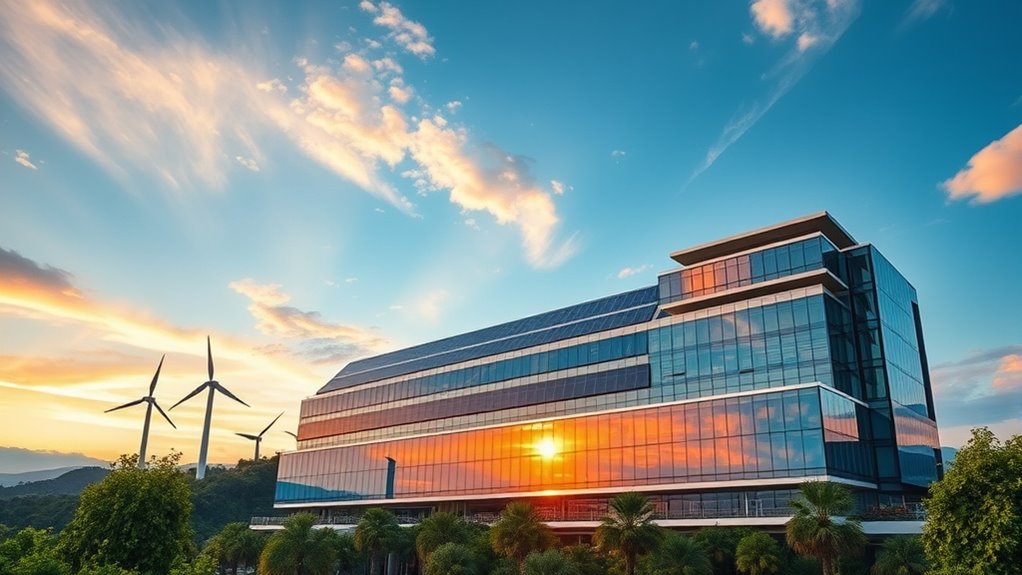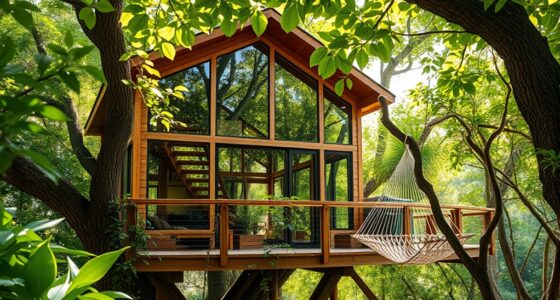Net-positive energy hotels lead the way by producing more energy than they consume annually, showcasing innovative designs and advanced technologies like solar panels, smart thermostats, and energy storage systems. They often incorporate eco-friendly features such as green roofs and urban farming, reducing water and energy use markedly. These hotels set new standards for sustainability, benefiting the environment and your experience. If you continue exploring, you’ll discover how these pioneering efforts are shaping the future of eco-friendly hospitality.
Key Takeaways
- Net-positive energy hotels generate more renewable energy than they consume annually, feeding excess back to the grid.
- They utilize innovative architectural designs, such as biophilic features and adaptive reuse, to enhance sustainability.
- Advanced technologies like smart thermostats, energy storage, and solar or wind power optimize energy efficiency.
- Case studies demonstrate that achieving net-positive energy is feasible through integrated renewable energy solutions.
- These hotels attract eco-conscious travelers, reduce costs, and set new standards for sustainable hospitality.
The Concept of Net-Positive Energy in Hospitality
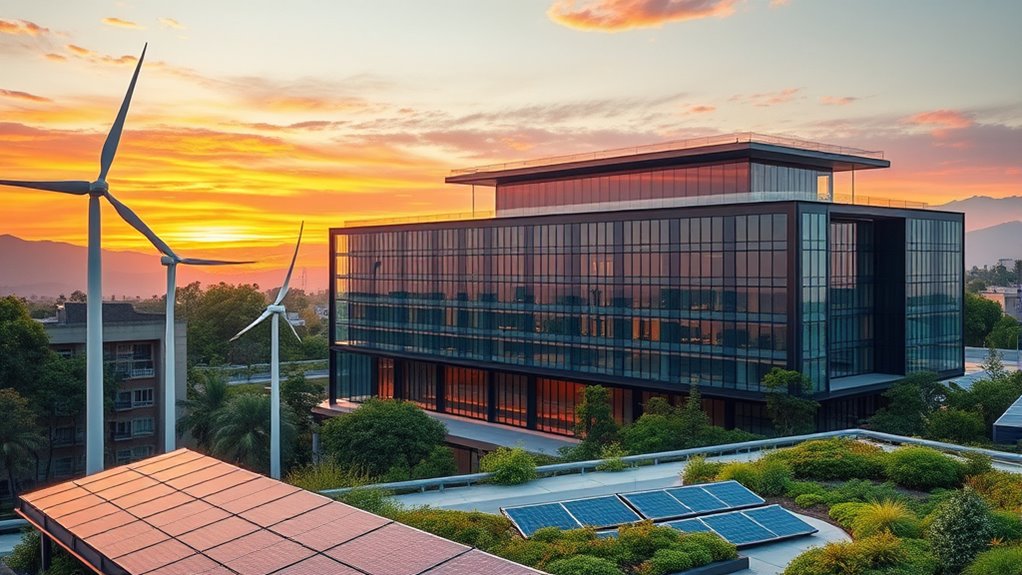
What does it really mean for a hotel to be net-positive energy? It means the hotel generates more energy than it consumes annually, contributing excess power back to the grid. Achieving this requires advanced energy storage solutions that store surplus energy for later use, ensuring continuous operation even when production dips. Smart grids play a pivotal role by intelligently managing energy flow, balancing supply and demand in real-time. These systems optimize energy use, minimize waste, and facilitate the integration of renewable sources like solar panels. When a hotel becomes net-positive, it not only reduces its carbon footprint but also sets a standard for sustainable hospitality. Energy management systems are essential tools that help monitor and optimize energy consumption in real time. This innovative approach transforms hotels into active participants in the energy ecosystem, promoting a cleaner, greener future.
Innovative Architectural Designs for Sustainability
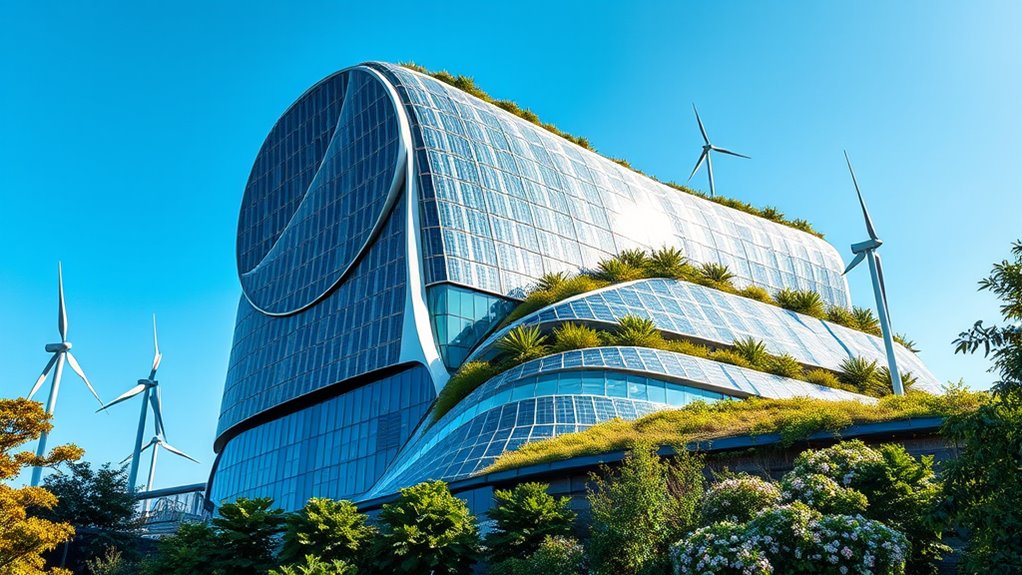
Innovative architectural designs are essential for enhancing a hotel’s sustainability footprint, seamlessly integrating eco-friendly features into its structure. By embracing biophilic design, you connect guests with nature through natural light, greenery, and organic materials, reducing energy needs and boosting well-being. Adaptive reuse allows you to repurpose existing buildings, minimizing waste and preserving cultural heritage while creating modern, sustainable spaces. These approaches foster a deep sense of environmental responsibility and innovation. Incorporating dynamic communication exercises into hotel staff training can further strengthen guest relationships and promote a positive atmosphere.
Cutting-Edge Technologies Powering Energy Surplus
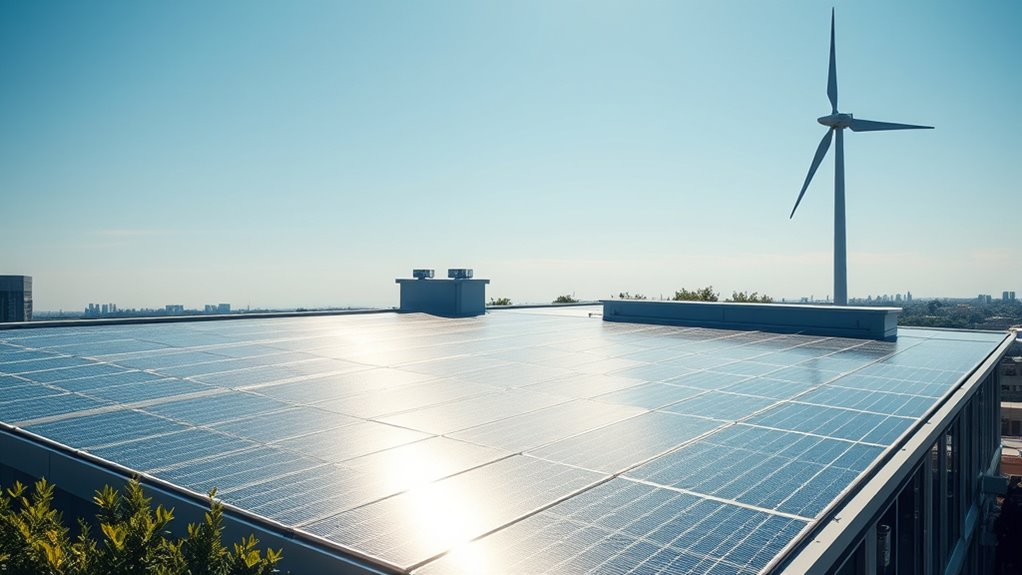
Advancements in clean energy technologies are transforming hotels from energy consumers into producers, generating surplus power that can be shared or stored. Smart thermostats play a vital role by optimizing heating and cooling, reducing energy waste, and adjusting settings based on occupancy patterns. These devices learn your preferences and fine-tune energy use, boosting efficiency. Meanwhile, energy storage systems allow hotels to capture excess energy generated during peak times, storing it for later use when demand is high or sunlight is scarce. This combination ensures a reliable energy supply, even when renewable sources fluctuate. Additionally, integrating high-performance projectors and optimizing lighting conditions can significantly enhance the overall energy efficiency of hotel entertainment and presentation spaces. By integrating smart thermostats and advanced storage solutions, hotels can maximize their energy surplus, reduce reliance on external power grids, and move closer to achieving net-positive energy status.
Renewable Energy Sources Employed by Leading Hotels

Many leading hotels turn to renewable energy sources to achieve net-positive energy goals. Solar power initiatives are common, harnessing sunlight to generate clean electricity. Wind energy adoption is also on the rise, helping hotels reduce their carbon footprint efficiently. Additionally, some establishments are exploring innovative energy-efficient upgrades to further minimize their environmental impact.
Solar Power Initiatives
Leading hotels are increasingly turning to solar power initiatives to reduce their environmental impact and achieve net-positive energy status. By installing solar panels, they harness sunlight to generate clean electricity, decreasing reliance on fossil fuels. Effective energy storage systems ensure that excess power is saved for nighttime or cloudy days, maximizing efficiency. These initiatives not only lower operational costs but also demonstrate a commitment to sustainability. Incorporating solar-powered attic fans can further enhance energy efficiency by providing cooling without increasing electricity bills. Highlight renewable energy efforts to attract eco-conscious guests
Wind Energy Adoption
Building on solar power efforts, hotels are now increasingly adopting wind energy to further reduce their carbon footprint. Wind turbines are installed on-site or nearby, capturing wind power to generate electricity. This renewable source complements solar, especially when combined with energy storage systems that store excess power for cloudy or calm days. By integrating wind energy, hotels can decrease reliance on fossil fuels and improve energy resilience. Some hotels even use vertical-axis turbines for quieter operation and better space utilization. Advancements in turbine technology are making wind energy more efficient and accessible for hospitality applications.
Case Studies of Pioneering Net-Positive Hotels

You’ll see how innovative design strategies are shaping net-positive hotels, making them more efficient and eco-friendly. By examining how these hotels integrate renewable energy, you’ll understand their practical approaches to sustainability. You’ll also learn about the impressive metrics they achieve, proving that net-positive energy is a realistic goal. Incorporating trailer music techniques can enhance the storytelling and emotional impact of sustainability campaigns, making their messages more compelling.
Innovative Design Strategies
Innovative design strategies play a vital role in transforming hotels into net-positive energy producers, demonstrating that sustainability and luxury can go hand in hand. Pioneering hotels incorporate urban farming, allowing guests to experience fresh, local produce while reducing their carbon footprint. Using biodegradable materials in construction minimizes environmental impact and promotes a circular economy. These hotels also maximize natural light and airflow, reducing energy consumption. By integrating green roofs and living walls, they enhance insulation and air quality. Additionally, embracing angel numbers can inspire innovative approaches to sustainability, guiding designers toward more harmonious and spiritually aligned concepts. – Foster community engagement through on-site urban farms – Use biodegradable materials for sustainable building practices – Design spaces that blend luxury with eco-consciousness, ensuring comfort and environmental responsibility
Renewable Energy Integration
Integrating renewable energy sources is essential for pioneering net-positive hotels to produce more energy than they consume. These hotels often incorporate solar panels, wind turbines, and geothermal systems to harness natural power efficiently. Using eco-friendly materials in construction not only reduces environmental impact but also enhances energy efficiency. Water conservation measures, like rainwater harvesting and low-flow fixtures, complement renewable energy efforts by lowering overall resource use. Pioneering hotels prioritize seamless integration of these systems to maximize energy generation and minimize waste. By designing buildings that optimize sunlight exposure and airflow, they ensure renewable sources operate at peak performance. Employing energy-efficient technologies further boosts their sustainability, ensuring that energy production exceeds consumption, setting a benchmark for eco-conscious hospitality.
Sustainability Metrics Achieved
Case studies of pioneering net-positive hotels demonstrate that these buildings consistently achieve impressive sustainability metrics, setting new standards for eco-friendly hospitality. They often surpass energy efficiency goals, generating more renewable energy than they consume. Water conservation strategies lead to significant reductions in water use, promoting responsible resource management. These hotels measure success through high energy efficiency, with some achieving net-positive energy balance; advanced water conservation systems reducing consumption by over 30%; and integrated sustainability metrics that showcase environmental and economic benefits. Furthermore, leveraging regional legal resources can facilitate the adoption of innovative sustainability practices and certifications.
Environmental and Economic Benefits of Going Net-Positive

Going net-positive isn’t just good for the environment; it also offers significant economic advantages. By embracing net-positive strategies, you can reduce operating costs through energy efficiency and water conservation efforts. These initiatives often lead to lower utility bills and less reliance on external resources. Additionally, net-positive hotels can influence urban planning by integrating sustainable infrastructure, which boosts community value and attracts eco-conscious travelers. This approach enhances your hotel’s reputation, driving increased bookings and revenue. Investing in renewable energy sources and sustainable design not only benefits the planet but also creates long-term financial savings. Overall, going net-positive aligns ecological responsibility with economic growth, making your hotel a leader in sustainability while reaping tangible benefits.
Challenges and Opportunities in Achieving Net-Positive Goals
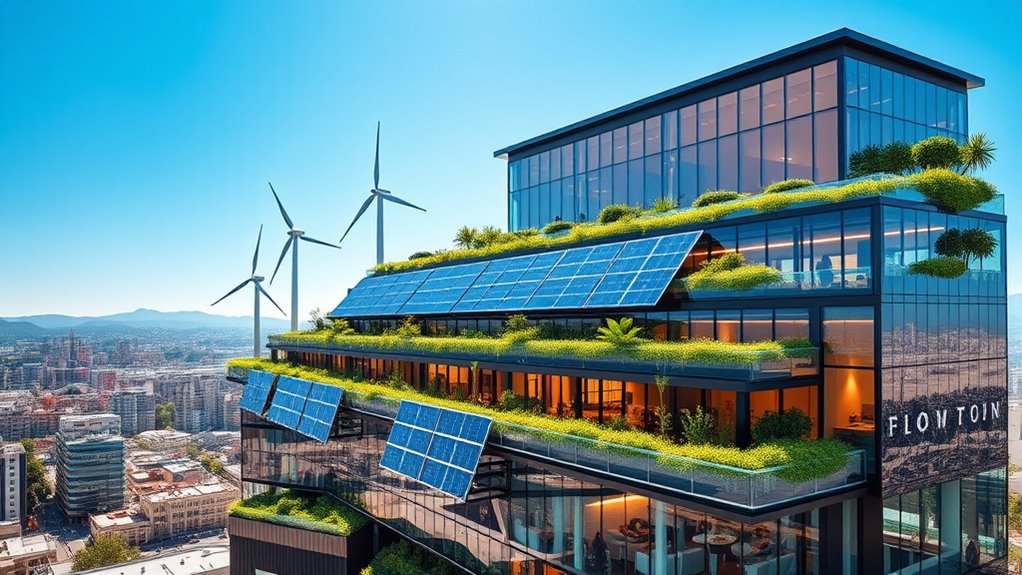
Achieving net-positive goals presents both significant challenges and promising opportunities for hotels. Implementing urban agriculture can boost local food sourcing, reduce supply chain impacts, and engage guests in sustainability efforts. However, it requires space, expertise, and ongoing maintenance. Water conservation is essential, yet balancing water use with lush landscapes or urban farming demands innovative solutions like rainwater harvesting or greywater recycling.
Balancing water use with lush landscapes and urban farms requires innovative conservation solutions.
Opportunities include:
- Integrating urban agriculture to foster community engagement and fresh produce.
- Leveraging water-saving technologies to lower consumption and operational costs.
- Enhancing guest experiences through sustainable practices that highlight eco-conscious efforts.
While these initiatives can be complex and resource-intensive, they push hotels toward holistic sustainability, ultimately aligning with net-positive ambitions.
The Future of Sustainable Hospitality and Energy Innovation

As hotels pursue net-positive energy goals, embracing innovative technologies and sustainable practices will shape the future of hospitality. You’ll see luxury amenities integrated with green solutions, elevating guest experiences without compromising sustainability. Advanced energy systems, like solar panels and smart building management, will optimize resource use efficiently. This blend of innovation and eco-consciousness will set new standards for sustainability and comfort. Here’s a glimpse of what’s ahead:
| Technology | Guest Experience Impact | Sustainability Benefit |
|---|---|---|
| Solar energy | Eco-friendly power source | Reduces carbon footprint |
| Smart rooms | Personalized comfort, energy savings | Minimizes waste |
| Green building designs | Enhanced aesthetics, eco-conscious | Lowers resource consumption |
Expect a future where luxury and sustainability go hand in hand, creating memorable stays that benefit both guests and the planet.
How Guests Can Support and Engage With Sustainable Hotels

Guests play a essential role in supporting sustainable hotels by making conscious choices during their stay. Your guest feedback helps hotels improve sustainability efforts and tailor experiences that promote environmental responsibility. Engaging with hotel programs fosters community involvement, strengthening local connections. To support these initiatives, consider:
- Sharing honest feedback to encourage greener practices
- Participating in eco-friendly activities or community events
- Choosing accommodations that prioritize renewable energy and conservation
Frequently Asked Questions
How Do Net-Positive Hotels Impact Local Communities Beyond Energy Savings?
When considering the impact of net-positive hotels, you realize they do more than just save energy. They actively promote community engagement by involving locals in sustainability initiatives and educational programs. This fosters a sense of pride and ownership. Additionally, their focus on local economic impact means they create jobs, boost local businesses, and attract eco-conscious travelers who support the community’s growth. Overall, these hotels positively shape local neighborhoods beyond energy savings.
What Training Do Hotel Staff Undergo for Sustainable Energy Management?
Think of your staff as the heartbeat of sustainable energy. You’re trained in renewable practices, learning how to maximize energy efficiency and reduce waste. Staff engagement is vital—they’re empowered to implement eco-friendly routines daily. This training symbolizes a shared commitment to the environment, turning knowledge into action. By fostering this understanding, your team becomes a powerful force, ensuring the hotel’s energy management supports a greener future for all.
Are There Specific Certifications for Net-Positive Hotels?
You might wonder if there are specific certifications for net-positive hotels. Yes, there are green building and renewable certifications like LEED Platinum and Living Building Challenge, which recognize hotels that produce more energy than they consume. These certifications guarantee your hotel meets high sustainability standards, showcasing your commitment to renewable energy and eco-friendly practices. Achieving them can boost your reputation, attract eco-conscious guests, and demonstrate leadership in sustainable hospitality.
How Do Net-Positive Hotels Handle Energy Storage During Low Production Periods?
During low production periods, net-positive hotels manage energy storage by storing excess energy generated during peak times. You’ll see them use advanced energy storage systems like batteries or thermal storage to hold this surplus. When energy production dips, they draw from these reserves to maintain operations, ensuring continuous energy supply. This approach helps balance supply and demand, keeping the hotel sustainable and reducing reliance on external energy sources.
What Are the Long-Term Maintenance Costs of Sustainable Energy Systems?
You might worry about high long-term maintenance costs of sustainable energy systems, but with thorough cost analysis and focus on system durability, you’ll find they’re often more affordable than traditional options. Properly maintained, these systems reduce operational expenses and last longer, saving money over time. Investing in quality components and regular upkeep guarantees your energy setup remains efficient, reliable, and cost-effective well into the future.
Conclusion
As you walk through these net-positive hotels, imagine walls that breathe with solar warmth, rooftops humming with wind’s whisper, and interiors alive with sustainable energy. You become part of a movement where innovation and nature dance in harmony, creating a future where every stay leaves a positive mark. Embrace this journey, knowing your choices power a brighter, greener world—one hotel, one guest, one moment at a time.

